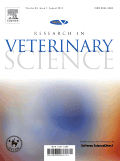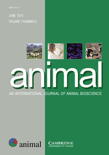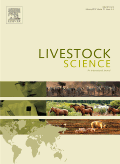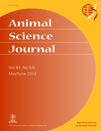
Animals
Scope & Guideline
Empowering animal research through open access collaboration.
Introduction
Aims and Scopes
- Animal Welfare and Behavior:
Research focusing on the welfare of domesticated and wild animals, exploring the impacts of environmental conditions, human interactions, and management practices on their behavior and overall well-being. - Genetics and Genomics:
Studies investigating the genetic basis of traits related to reproduction, health, and growth, utilizing genome-wide association studies (GWAS), transcriptomics, and molecular techniques to enhance breeding programs and conservation efforts. - Nutrition and Feeding Practices:
Exploration of dietary impacts on animal health, performance, and product quality, including the evaluation of alternative feed sources, supplementation strategies, and the role of probiotics in livestock nutrition. - Disease Management and Veterinary Medicine:
Research addressing the epidemiology, diagnosis, and treatment of animal diseases, including the development of vaccines, antimicrobial resistance, and novel therapeutic approaches in veterinary practices. - Conservation and Wildlife Management:
Studies examining the ecological and conservation needs of various species, focusing on habitat preservation, species interactions, and the effects of human activities on wildlife populations. - Technological Innovations in Animal Science:
Research utilizing advanced technologies such as machine learning, imaging, and sensor-based monitoring to improve animal husbandry practices, welfare assessments, and disease detection.
Trending and Emerging
- One Health Approach:
An increasing trend towards integrating human, animal, and environmental health, emphasizing the interconnections between these domains in addressing zoonotic diseases and promoting overall health. - Sustainable Animal Production:
Research focusing on sustainable practices in animal agriculture, including the use of alternative feed sources, waste management, and strategies to reduce greenhouse gas emissions. - Advanced Genetic Technologies:
The use of CRISPR, genomic selection, and other advanced genetic tools is on the rise, providing new insights into breeding strategies and genetic improvement of livestock. - Microbiome Research:
A growing interest in understanding the gut microbiome's role in animal health and nutrition, leading to research on probiotics, prebiotics, and their effects on growth and disease resistance. - Animal-Assisted Interventions:
Increasing attention on the therapeutic roles of animals in human health contexts, exploring their use in psychological therapies, rehabilitation, and support for mental health. - Technological Integration in Animal Care:
The incorporation of technology such as AI, machine learning, and sensor technologies for monitoring animal behavior, health, and welfare is gaining momentum, enhancing precision in animal management.
Declining or Waning
- Traditional Animal Husbandry Practices:
Research focusing on conventional methods of animal husbandry has decreased as the field shifts towards more sustainable practices and innovative technologies. - Invasive Species Management:
Though still relevant, studies specifically centered on invasive species management have become less prominent, possibly due to a growing emphasis on holistic ecosystem management and conservation strategies. - Basic Animal Physiology Studies:
There has been a noticeable reduction in basic physiological studies, as more applied research focusing on practical applications in veterinary and agricultural settings takes precedence. - Ethological Studies in Captivity:
Research examining animal behavior in captivity without a strong welfare focus is declining, as there is a greater emphasis on welfare and environmental enrichment in captive settings.
Similar Journals

Large Animal Review
Pioneering methodologies for veterinary excellence.Large Animal Review is a prestigious academic journal dedicated to advancing the field of veterinary science, particularly focusing on the health and management of large animals. Published by the SIVAR-SOC ITALIANA VETERINARI ANIMALI REDDITO, this journal is an invaluable resource for researchers, practitioners, and students eager to explore innovative methodologies, research findings, and case studies related to veterinary medicine for larger species. With a commitment to quality, Large Animal Review holds a Q3 categorization in the Veterinary (miscellaneous) sector according to the 2023 metrics, indicative of its growing influence within the academic community. The journal benefits from an international readership and is dedicated to fostering interdisciplinary collaborations, making it an essential addition to any professional's library. The journal is accessible through various platforms, ensuring wide distribution of its valuable content, as it strives to enhance the understanding and welfare of large animals across diverse settings.

Translational Animal Science
Transforming Animal Science into Practical SolutionsTranslational Animal Science, published by Oxford University Press Inc, stands as a prominent journal in the fields of Animal Science and Zoology as well as Veterinary Sciences, achieving a commendable Q2 ranking in both categories for 2023. With an E-ISSN of 2573-2102 and transitioning to an Open Access model since 2017, this journal fosters accessibility and dissemination of vital research that bridges the gap between basic animal science and its practical applications. The journal's significant impact factor, where it ranks in the 71st and 65th percentiles respectively for Veterinary and Agricultural and Biological Sciences disciplines, highlights its importance as a resource for emerging trends and innovations in animal research. With submissions accepted until 2024, Translational Animal Science not only contributes to advancing knowledge but also aims to engage a broad audience of researchers, professionals, and students dedicated to improving animal health and welfare. Based in India, the journal serves as an essential platform for the exchange of scientific ideas that facilitate progress within these vital fields.

Abanico Veterinario
Advancing Veterinary Knowledge for a Healthier TomorrowAbanico Veterinario is a prominent academic journal dedicated to the field of veterinary science, published by Sergio Martinez Gonzalez. With its ISSN 2007-4204 and E-ISSN 2448-6132, this journal serves as a vital resource for researchers, practitioners, and students interested in the latest advancements and research in veterinary medicine. Although Abanico Veterinario operates on a non-open access model, it provides insightful content that addresses a diverse range of topics such as animal health, veterinary ethics, and innovative practices. The journal aims to promote knowledge sharing and foster collaboration within the veterinary community, ultimately contributing to improved animal care and welfare. With a commitment to excellence and a growing reputation within the field, Abanico Veterinario stands as an essential platform for those seeking to enhance their professional skills and stay abreast of emerging trends in veterinary science.

Revista Colombiana de Ciencias Pecuarias
Advancing Knowledge in Animal Science and Veterinary StudiesRevista Colombiana de Ciencias Pecuarias, an esteemed publication in the field of Animal Science and Veterinary Studies, is published by the Universidad de Antioquia, Faculty of Agricultural Sciences. Since its inception in 1996, this Open Access journal has become a vital resource for the dissemination of research and advancements within the agricultural and biological sciences, specifically targeting the veterinary and animal husbandry sectors. Situated in Colombia, its mission is to support and promote scientific knowledge through rigorous review processes and high-quality articles. The journal’s recent classification includes Q4 in Animal Science and Zoology and Q3 in Veterinary categories, illustrating its commitment to enhancing its scientific impact. As it converges from 2008 to 2024, this journal aims to engage researchers, professionals, and students alike, establishing a collaborative environment for innovative research and findings that shape the future of animal sciences globally.

Indian Journal of Animal Research
Unveiling Insights for a Healthier Animal WorldIndian Journal of Animal Research is a prominent publication in the field of animal science and veterinary medicine, established to advance the understanding of animal husbandry, biology, and health. Published by the AGRICULTURAL RESEARCH COMMUNICATION CENTRE, this journal has been contributing to the scholarly discourse since 2008, with a commitment to high-quality research dissemination. With its current Q3 ranking in both Animal Science and Zoology and Veterinary (miscellaneous) categories, it serves as a crucial platform for researchers aiming to share insights and innovations within these disciplines. Although it operates without open access, it remains widely recognized, fostering a collaborative academic environment. The journal's impact is underscored by its presence within the Scopus database, providing valuable rankings in both General Veterinary and Animal Science and Zoology fields. Researchers, professionals, and students interested in veterinary advancements and animal research will find this journal a valuable resource for the latest scientific findings and discussions. Join the community of scholars igniting progress in the vital realm of animal research.

RESEARCH IN VETERINARY SCIENCE
Advancing Veterinary Knowledge for a Healthier TomorrowRESEARCH IN VETERINARY SCIENCE, published by Elsevier Science Ltd, stands as an authoritative platform in the field of veterinary studies. With its origins dating back to 1965, this prestigious journal is recognized for its contribution to the advancement of veterinary knowledge and practices, boasting a remarkable Q1 categorization in Veterinary (miscellaneous) and ranking 24th out of 194 in the Scopus veterinary general category, placing it in the top 13% of its field. The journal presents a diverse range of research articles that explore critical topics in veterinary science, thereby facilitating evidence-based practices and innovations. Although currently not an open-access journal, it remains highly accessible through institutional and personal subscriptions, allowing researchers, professionals, and students to benefit from its rich collection of studies. As it moves toward 2024, RESEARCH IN VETERINARY SCIENCE continues to be a vital resource for those dedicated to improving animal health and advancing veterinary science.

Thai Journal of Veterinary Medicine
Advancing veterinary science for a healthier tomorrow.Thai Journal of Veterinary Medicine, published by Chulalongkorn University, serves as a vital resource for researchers, practitioners, and students in the field of veterinary science. With an ISSN of 0125-6491, the journal has been providing a platform for the dissemination of original research and reviews since its inception, with a focus on advancing veterinary practice and animal health in Thailand and the broader Southeast Asian region. The journal is recognized in the Scopus database, currently ranked in the Q4 category for Veterinary (miscellaneous), reflecting its commitment to quality despite being in a highly competitive space. The scope of the journal encompasses a wide array of topics pertinent to veterinary medicine, ensuring accessibility to diverse veterinary disciplines. While the journal currently does not offer an open-access option, it remains dedicated to contributing valuable knowledge and insights to the veterinary community, supporting the improvement of animal welfare and public health initiatives in the region. As it continues to publish until 2024, the Thai Journal of Veterinary Medicine invites contributions that align with its objectives of fostering scholarly discourse and advancing veterinary research.

Animal
Connecting researchers for a sustainable future in animal welfare.Animal is a leading academic journal published by Elsevier that stands at the forefront of research in the field of Animal Science and Zoology. Founded in 2007, it has rapidly garnered a prestigious reputation, achieving a remarkable Q1 ranking in its category for the year 2023, placing it in the top 4% of journals in the discipline. With an impressive impact, as indicated by its rank of 19 out of 490 in Agricultural and Biological Sciences on Scopus, this journal serves as a vital platform for researchers, professionals, and students to disseminate groundbreaking findings and interdisciplinary studies. Animal not only offers paid subscription access but also provides an option for Open Access, thereby enhancing the visibility and reach of significant research contributions. With its comprehensive scope and commitment to advancing the understanding of animal biology, behavior, and welfare, Animal plays a crucial role in shaping the future of animal science. For anyone invested in the environment, veterinary medicine, or wildlife management, this journal is an essential resource that fosters knowledge exchange and continued developments in the field.

Livestock Science
Advancing Knowledge in Animal Science and Veterinary MedicineLivestock Science is a prestigious academic journal published by ELSEVIER, dedicated to the comprehensive study of animal science and veterinary medicine. With an esteemed Q1 ranking in both the fields of Animal Science and Zoology, as well as Veterinary (miscellaneous) in 2023, this journal is recognized for its impactful contributions to the understanding of livestock health, production, and management. The journal has consistently earned its high position within Scopus, ranking 26th out of 194 in General Veterinary and 86th out of 490 in Animal Science and Zoology, reflecting its significant influence within the research community. The open access policy allows for broader dissemination of knowledge, promoting collaboration among researchers, professionals, and students alike. With its continuous publication cycle from 2006 to 2024, Livestock Science remains an essential resource for anyone interested in the advancements, challenges, and innovations within the field of livestock management and veterinary practices.

ANIMAL SCIENCE JOURNAL
Exploring Innovations in Agricultural and Biological SciencesAnimal Science Journal, published by Wiley, stands as a premier platform for advancing knowledge in the fields of Agricultural and Biological Sciences, Animal Science and Zoology, and Food Science. With an ISSN of 1344-3941 and an E-ISSN of 1740-0929, this journal not only enjoys a commendable Q2 ranking across multiple categories, reflecting its significance and impact within the academic community, but it also ranks within the top percentiles in terms of Scopus rankings. Operating out of the United Kingdom, the journal covers a broad spectrum of research topics relevant to animal science, encompassing both theoretical insights and practical applications. While it is not an open access journal, it remains an essential resource for researchers and practitioners eager to enhance their understanding of animal sciences, contribute to ongoing debates, and stay abreast of the latest findings from 2003 through 2024. Scholar engagement and innovative research are central to the journal’s objectives, making it an invaluable asset for students, professionals, and academics alike.